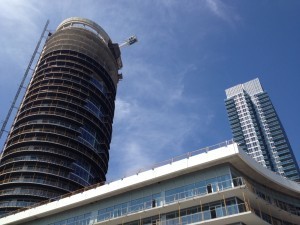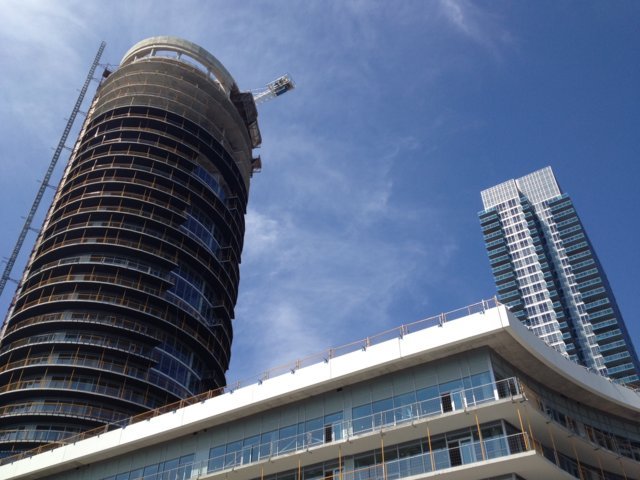 The decade-long housing boom in Toronto has seen an unprecedented level of construction activity with a good 159 towers currently under construction, earning the city the unflattering reputation of being the world’s “Tower City.” Toronto is now home to some world-famous towers such as Trump Tower, Four Seasons and Shangri-La. But the city will have hell to pay for the absurdly high number of condos built in the past decade, if predictions by housing experts are anything to go by. The Toronto luxury condo market is facing uncertain times with mixed expectations for the erstwhile high-flying housing market segment. On one hand, there are grim predictions of a “looming crash” and a “housing bubble burst” being pounded out by local housing stalwarts such as Capital Economics’ David Madani and TREB (Toronto Real Estate Board). On the other hand, there are less dire predictions of a “soft landing” by Finn Poschmann of Toronto’s C.D. Howe Institute as well as CIBC (Canadian Imperial Bank of Commerce), who see the condo market in Toronto as “reasonably balanced.” Out of the mixed “the-sky-is-falling” and “no-cause-for-alarm-yet” predictions, one thing is abundantly clear: The Toronto condo market is in a clear downward spiral in terms of the number of condo units sold in recent months compared to the past few years, as well as the number of willing buyers available.
The decade-long housing boom in Toronto has seen an unprecedented level of construction activity with a good 159 towers currently under construction, earning the city the unflattering reputation of being the world’s “Tower City.” Toronto is now home to some world-famous towers such as Trump Tower, Four Seasons and Shangri-La. But the city will have hell to pay for the absurdly high number of condos built in the past decade, if predictions by housing experts are anything to go by. The Toronto luxury condo market is facing uncertain times with mixed expectations for the erstwhile high-flying housing market segment. On one hand, there are grim predictions of a “looming crash” and a “housing bubble burst” being pounded out by local housing stalwarts such as Capital Economics’ David Madani and TREB (Toronto Real Estate Board). On the other hand, there are less dire predictions of a “soft landing” by Finn Poschmann of Toronto’s C.D. Howe Institute as well as CIBC (Canadian Imperial Bank of Commerce), who see the condo market in Toronto as “reasonably balanced.” Out of the mixed “the-sky-is-falling” and “no-cause-for-alarm-yet” predictions, one thing is abundantly clear: The Toronto condo market is in a clear downward spiral in terms of the number of condo units sold in recent months compared to the past few years, as well as the number of willing buyers available.
The Greater Toronto Area Realtors Association recently released a report stating that condominium sales made via the Toronto Multiple Listing Services platform were down to 5,759 units in February 2013 compared to 6,809 in February 2012. That’s a drastic fall, to put it mildly, even after adjusting for the extra day in February 2012. The trend of lower sales volumes has been going on for months now and may serve as an indicator that the worst is yet to come.
The “soft landing” proponents are quick to point out that in spite of falling sales numbers average transaction price is rising. Average transaction price in February 2013 stood at $510,580 while in February 2012 it was $510,249. But the concern is that while the average transaction price rose only marginally in February 2013, by less than 1% compared to the previous year’s levels, the adjusted number of units sold (adjusted to account for the extra day in February 2012) fell a whopping 16%.
2014 is expected to be the real turning point for Toronto’s luxury condo market. The average annual condominium units built in Toronto in the past ten years is 15,000. CIBC predicted that 35,000 units would be completed in 2014, effectively taking this housing market segment into previously uncharted waters. Although CIBC has since revised that number downwards to about 23,000 units for the year, that is still way above the average and brings very real concerns about the likely effects of overbuilding and consequent oversupply – a scenario that has hitherto never been witnessed in Toronto’s luxury condos market. Toronto research firm Urbanation Inc. also released their report for the luxury market sector, and those figures paint an even grimmer picture. According to their research, the number of unsold inventory for Toronto’s luxury condos stood at an unprecedented 18,845 in the first quarter of 2013, representing an astronomical 21% rise compared to the same period last year.
Ridiculously High Rentals
The case of $1,900 per square foot for the Trump Tower is well documented. It is difficult to understand just how speculative investors can be when purchasing high-end real estate property, expecting to flip it for a quick buck. Those with a more pessimistic view expect at least a 30% downward adjustment on these ridiculously high-priced units.
Lower Financing
CIBC recently released tentative estimates of an approximate $2-3 billion financing gap faced by Toronto’s luxury condo developers and second-tier players. There is a real possibility that Toronto’s highly leveraged condo investors will begin to see red and quickly move to hedge their bets. How? By selling off their condos in a bid to stem the looming danger of losing money when house rentals ease off and vacancy rates rise.
Concerns regarding an oversupply of condos in Toronto are very real. RealNet Canada reported that there are currently 61,000 condo units under construction in Toronto – the most ever at any one time in the city’s history.
Ongoing Mortgage Wars
The availability of cheap mortgages has directly contributed to the housing boom. Benchmark interest rates have held steady at just 1% since 2009. The Canadian Government has tightened mortgage rules in a bid to curb runaway levels of household debts and also orchestrate what it hopes will be a “soft landing” for the housing market. The government’s latest move in June 2013 saw amortizations shortened from the usual 30 years to 25 years, the 4th time it has tightened the noose on home loan regulations. The government is also piling pressure on banks not to provide these loans at below 3% interest.
The Canadian Government’s move may seem benevolent and in the best interest of its citizenry. However, it has had several negative repercussions, the foremost being that most aspiring first-time homeowners have now been shut out of owning their own homes. The banks are also strongly of the opinion that the Canadian Government should stop interfering with mortgage pricing.
Too Little Too Late
The Canadian Government’s moves to create a “soft landing” for the impending housing crash are reminiscent of 1989.The measures taken by the government back then proved to be far from adequate; the housing bubble still went full steam ahead and eventually crashed out spectacularly. The real estate sector is usually the hardest hit during recessions or in the case of economic slowdowns. Despite the preventive measures undertaken by the government to return some sense of normalcy to the manic-depressive housing sector, signs of a looming housing bubble burst are legion and investors should not hold their breath in the hope of a miraculous turnaround, at least not anytime soon. A looming crash of the luxury Toronto condo market is in the offing.

